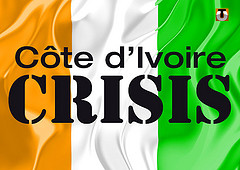Cote D’Ivoire: Another UN Success

If anyone imagined that the act of intervention by itself is always enough for the United Nations to emerge unscathed, one only need to look at the chequered history of the various UN attempts to hold the line in post colonial Congo-Kinshasa, better known today as the Democratic Republic of Congo.
As it happens I travelled with the Secretary General and his staff on what was Ban ki moon’s first trip to Africa shortly after he had been elected. I saw at first hand the complexities of an operation in a country the size of Western Europe, and a country that had witnessed more casualties than there had been in First World War in Europe. I still have a commemorative shield given to all of us correspondents on that trip by William Lacy Swing, the SG’s special representative – for the UN’s mission in the DRC, known as MONUC, was – and remains – the glue that helps hold the country together.
So I welcome the UN’s intervention in Cote D’Ivoire, as others point excitedly at France and accuse her of ‘neo colonialism’. A joint UN/French force finally arrested former President Laurent Gbagbo yesterday and is holding him for his own safety – while presumably prosecutors from the ICC sharpen their pencils. As with the Libyan no fly zones, the UN had been mandated to ensure that the results of Cote D’Ivoire’s Presidential election be respected, and since ex President Gbagbo couldn’t respect them, he finally had to be arrested. Now the winner of those elections, Alassane Ouattara, will take his rightful place as Head of State.
The military intervention didn’t simply take place because the international community knew that there had been a clear winner, but because the former President, like Gadaffi, was quite prepared to allow the civilian population to be collateral damage.
‘Responsibility to Protect’ or ‘R2P’ as it is known did not of course emanate as a doctrine from Ban ki moon’s first term. But its practical implementation is most certainly coming to be most closely associated with this quietly determined, and more confident, Secretary General.
The UN is no longer being seen as a sometimes dallying, hand ringing bystander to the abuse of human rights but as an active leader in stopping it. If I was a Cote’ D’Ivorian, facing a thug wielding a machete, who claimed to be supporting a president who had been voted out of office, I wouldn’t care whether it was a blue beret or a French soldier, who came to my aid.
This is the UN and the Secretary General, at their active best, confident in their mission and clear about their responsibilities. How refreshing.




